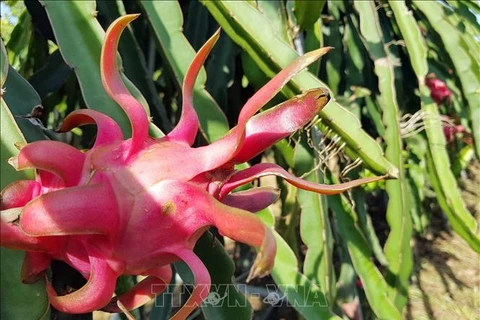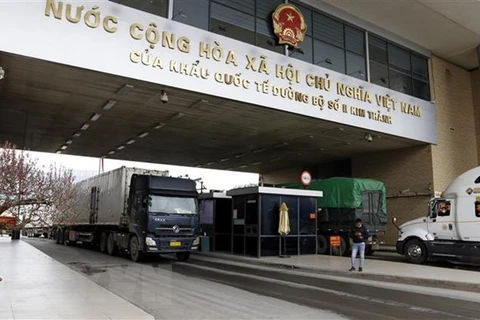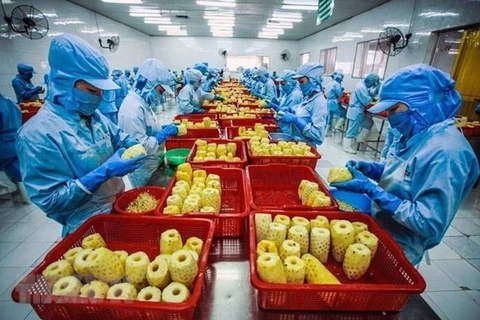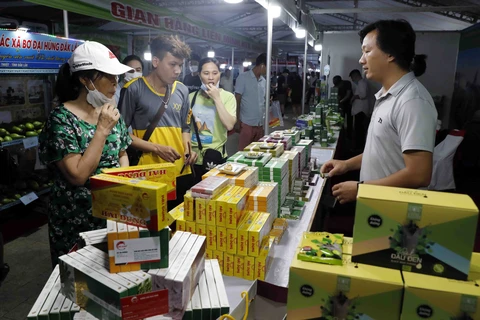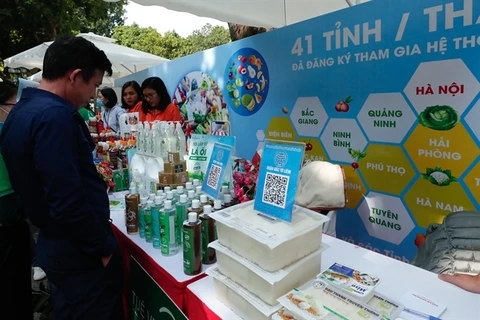Hanoi (VNA) – Each year, Vietnam exports billions of USD worth of agricultural products and food through a wide supply network. Retail chains have helped stabilise the domestic market and prevent volatile price hikes during the complex situation brought on by the COVID-19 pandemic.
However, increasingly strict requirements of customers and demanding standards of export markets require businesses to continuously invest and improve the quality of products and ensure smooth running supply chains.
The perspective was discussed at a seminar on enhancing the role and responsibility of food producing and trading enterprises in the new context, which was held by the Ministry of Industry and Trade (MoIT) in Hanoi on June 30.
Ensuring adequate supply of safe food and essential goods
During the past two years impacted by the COVID-19 pandemic, the Vietnamese economy in particular and the world economy in general have suffered great losses. Strict social distancing rules under the government’s Directive 16 had severely impacted produce operations and trading enterprises, with disruptions recorded nationwide.
In that context, Deputy Director of the MoIT’s Department of Domestic Market Le Viet Nga stressed that ensuring adequate food supplies, stabilising market prices, and supporting production and import-export activities are critical. They work in collaboration with localities, businesses, and relevant units to ensure supply chains run smoothly.
The Department of Domestic Market has also mapped out plans to support the supply of goods for specific localities if necessary, ensuring enough essential goods for people in all circumstances. It has also requested major distribution businesses to increase inventories in the event of necessity.
According to the Department of Domestic Market, in 2021, big retailers such as Big C&Go, Satra Food, MM Mega Market, and Sai Gon Co.op made great efforts in seeking supplies and ensuring adequate inventories. Produce quality and price are important factors for quarantine establishments, hospitals and especially people in pandemic-hit areas and during the peak occasions such as Tet – the annual traditional festival of Vietnamese people.
It is necessary to carefully study technical standards
Vietnam’s farm produce and foodstuffs are exported to many countries and territories around the world, including the choosiest markets.
Regarding new issues in meeting technical requirements related to food safety for several countries and territories, Deputy Director of the MoIT’s Department of Science and Technology said international trade among nations and regions is now regulated by a system of free trade agreements signed bilaterally and multilaterally.
In addition, in current times products imported or exported are also regulated by each nation. The regulations in free trade agreements or national standards often include “non-tariff barriers” and “tariff barriers”, he said.
As more and more free trade agreements have been signed, almost all “tariff barriers” have been removed in line with the common principle of creating the most favourable conditions for trade. Hence, issues related to tariffs, customs, quotas, administrative procedures and market admission conditions are actually no longer obstacles to any investor, producer, or trader, the official said.
Tan held that, in order to avoid economic losses and long-term impacts on their prestige, exporters should be cautious. They must carefully study regulations and technical barriers to trade (TBT) as well as sanitary and phytosanitary measures (SPS) related to products of each market through consulting agencies and organisations.
This will help enterprises minimise time and costs, especially when products were exported but subject to seizure and lawsuits because they did not meet requirements of importing countries, he stressed.
In fact, new-generation free trade agreements such as the Comprehensive and Progressive Agreement for Trans-Pacific Partnership (CPTPP) and the EU-Vietnam Free Trade Agreement (UVFTA) have made remarkable contributions to promoting the country’s trade. However, they have also required Vietnamese food and agricultural products to meet tougher standards./.


